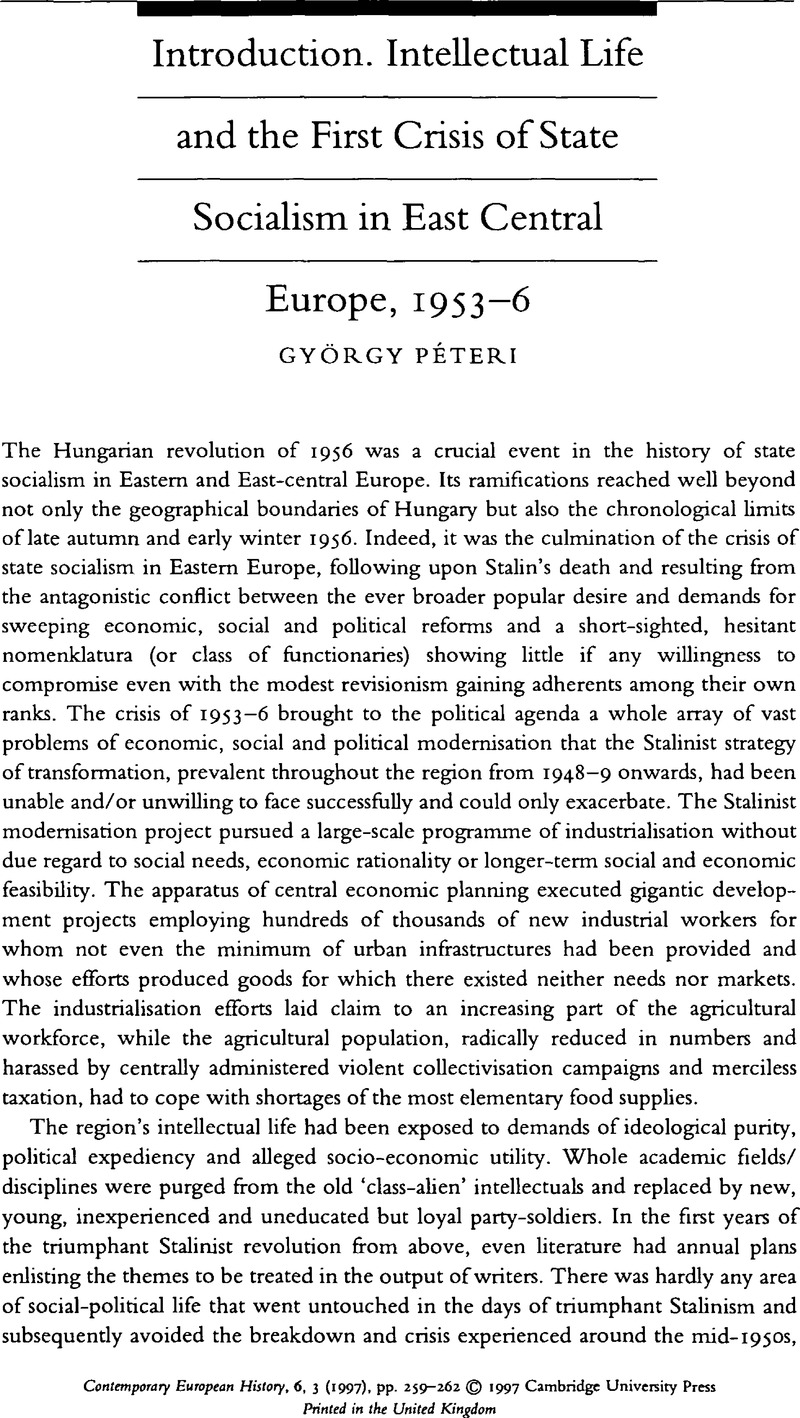Published online by Cambridge University Press: 12 September 2008

1 To take only the latest important items in what is a long series of highly valuable publications, we should mention here János M. Ranier, Nagy Imre. Politikai életrajz [Imre Nagy: A Political Biography], I: 1896–1953 (Budapest: T956-OS Intézet, 1996); Éva Standeisky, Az írók és a hatalom, 1956–1963 [The Writers and the Power, 1956–1963], (Budapest: 1956-os Intézet, 1996); or the three volume handbook of the 1956 revolution: András B. Hegedüs, Péter Kende, György Litván, (eds.), 1956 kézikönyve, I: Kronológia; II: Bibliográfia; III: Megtorlás és emlékezés [Repression and remembering], (Budapest: 1956-os Intezet, 1996). In the context of the present discussion, the most important item published in the series of the Institute of Political History is Zoltán Ripp, Belgrád és Moszkva között. A jugoszláv kapcsolat és a Nagy Imre-kérdés (1956 november-1959. február) [Between Belgrade and Moscow: Relations with Yugoslavia and the Imre Nagy Question], (Budapest: Politikatörténeti Alapítvány, 1994, ‘Politikatörténeti Füzetek’, V.)
2 Svašek, Maruška, Styles, Struggles, and Careers: An Ethnography of the Czech Art World, 1948–1992 (Academisch Proefichrift; Amsterdam: Universiteit van Amsterdam, 1996).Google Scholar
3 Cf. Wojciechowski, Aleksander's, Olschowsky, Heinrich's and Prokop, Jan's papers in Das Jahr 1956 in Ostmitteleuropa, ed. Hahn, Hans Henning und Olschowsky, Heinrich (Berlin: Akademia Verlag, 1996).Google Scholar
4 The workshop entitled ‘1956 and the Intellectuals’, the first of what is planned as a series of Trondheim Seminars on the Intellectual Life of Eastern and East Central Europe, was held between 17 and 21 August 1996. Participants were as follows: Lee Congdon, John Connelly, Krystyna Kersten, Pawel Machcewicz, György Péteri, János M. Rainer, Éva Standeisky and Maruška Svašek. The participants' thanks are due to Professors Kathleen Burk of University College London and Peter Pastor of Montclair State University for the generous intellectual assistance they rendered us by acting as rapporteurs to our seminar. We are also indebted to the Faculty of Arts of the Norwegian University of Science and Technology and to the Royal Air Force Academy of Norway for the support and hospitality which was so crucial for the success of our seminar. The assistance of research students Erik Ingebrigtsen, and Aleksandra Witczak and of Professor Gudmund Stang should be credited here, too, as it constituted the solid foundation upon which smooth organisation and a most conducive and pleasant social atmosphere depended.
5 For an interesting discussion of the conceptual distinction between intellectuals providing a ‘critical, transforming challenge’ to prevailing cultural assumptions and political power, and an intelligentsia providing ‘a legitimating, technical support for the cultural and political systems that define and dominate our society’, see Kramer, Lloyd, ‘Habermas, Foucault, and the Legacy of Enlightenment Intellectuals’, in Fink, Leon, Leonard, Stephen T. and Reid, Donald M. (eds), Intellectuals and Public Life. Between Radicalism and Reform (Ithaca/London: Cornell University Press, 1996), 29–50.Google Scholar